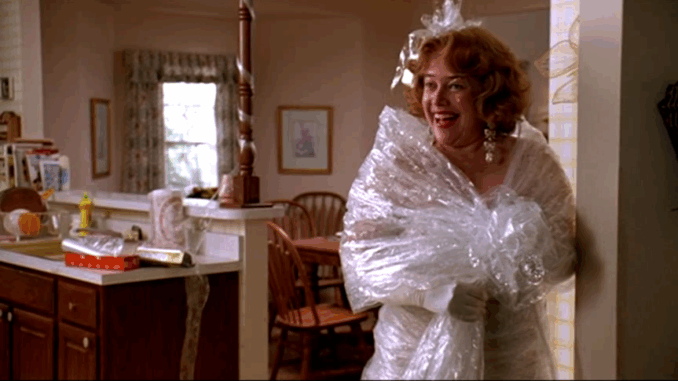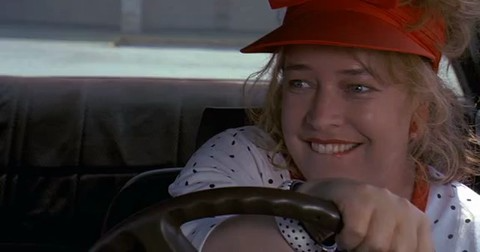
In a world that often diminishes the voices of middle-aged women, Fried Green Tomatoes offers a rare and triumphant narrative through the emotional metamorphosis of Evelyn Couch. At the beginning of the film, Evelyn is a textbook case of female invisibility — overlooked by her husband, dismissed by society, and imprisoned by outdated norms of femininity. But by the end, she emerges not only changed, but empowered — a “warrior queen” with a voice, a purpose, and a whole new way of seeing herself.
This isn’t just Evelyn’s story. It’s a rallying cry for self-worth in the second act of life.
Trapped in a Life of Shrinking
We meet Evelyn as she clings desperately to self-help tapes, Weight Watchers meetings, and clingy lingerie — anything that might make her desirable or relevant again. Her husband Ed hardly notices her. Strangers cut in front of her in line. Store clerks ignore her. At home and in public, she’s shrinking, emotionally and physically, in a world that has told her she’s no longer needed.
She blames herself — for aging, for gaining weight, for not being “enough.” But Evelyn’s real crime, in society’s eyes, is being a woman who’s no longer young, no longer newlywed, and no longer “pleasing.”
Meeting Ninny: The Spark of Change
Everything begins to shift when Evelyn meets Ninny Threadgoode, the feisty, talkative older woman in the nursing home who regales her with tales of the Whistle Stop Café. Ninny isn’t meek or afraid to take up space. She’s bold, opinionated, and unashamed of her stories. She remembers what it was like to live.
As Evelyn listens to Ninny’s memories of Idgie and Ruth — two women who defied expectations, took risks, and loved freely — she begins to awaken. Something inside her stirs. A whisper at first: You could live like that, too.
The Supermarket Scene: Reclaiming Her Space

The turning point comes in one of the film’s most iconic scenes. Evelyn, having waited patiently for a parking spot at the grocery store, is cut off by two younger women who smugly shout, “Face it, lady — we’re younger and faster!”
Evelyn doesn’t just accept this indignity. She reverses and rams their car six times. “Tawanda!” she yells, invoking her inner warrior.
This is more than comedy. It’s catharsis. For Evelyn, this moment is about rage finally being allowed a voice. Her entire life, she’s been told to be polite, ladylike, invisible. In five seconds of rebellion, she rewrites the rules.
The Rise of Tawanda
“Tawanda” becomes Evelyn’s alter ego — a mythical, fierce, fearless woman who takes no disrespect. Through her, Evelyn begins to draw boundaries. She speaks up when Ed dismisses her. She reclaims control over her body, not for approval, but for power. She paints, she gardens, she reimagines herself.
Tawanda is not about violence. She’s about self-worth. She allows Evelyn to confront her internalized shame, grief, and the quiet rage of decades spent serving others while being ignored.
Becoming Her Own Heroine
While the story of Idgie and Ruth gives Evelyn a lens through which to understand bravery, it’s in the present-day arc that we see her growth most vividly. She doesn’t need anyone to rescue her. She doesn’t even need Ed to change. She chooses to rescue herself.
She becomes a friend to Ninny, an advocate for her care, and begins creating art. When Ninny’s house is gone, Evelyn doesn’t crumble — she takes action. She invites Ninny to live with her, flipping their dynamic from student to caretaker, from listener to leader.
In doing so, Evelyn rewrites the script of her life — from passive housewife to a woman who chooses joy, friendship, and freedom.
Evelyn’s Emotional Rebirth
By the end of the film, Evelyn walks taller. Her clothes are brighter. She smiles differently — from within. She no longer fears aging, because she’s found meaning and self-respect.
She hasn’t become someone else. She’s become more of herself.
